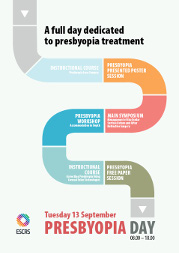Posters
New onset atrial fibrillation following sub-Tenon's anaesthesia
Poster Details
First Author: E. Ah-kee UNITED KINGDOM
Co Author(s): J. Li Yim
Abstract Details
Purpose:
The aim of this report is to describe a case of new onset atrial fibrillation following sub-Tenon's block.
Setting:
University Hospital Ayr, United Kingdom
Methods:
An 88 year-old male with a history of myocardial infarctions was given a sub-Tenon's block prior to cataract surgery with lens implantation. Preoperatively, blood pressure was 150/70mmHg, pulse was regular at 62 beats/minute and electrocardiogram was unremarkable. Following topical anaesthesia, the conjunctiva and sub-Tenon's layers were opened with curved scissors and a blunt cannula was used to administer 2mL of 2% lignocaine and 2mL of 0.5% bupivacaine in the sub-Tenon's space resulting in adequate akinesia. During phacoemulsification, his pulse dropped to 36 beats/minute. The procedure was paused and the patient denied any symptoms. The procedure was completed without any complications.
Results:
A post-operative cardiovascular examination revealed an irregular pulse. This was confirmed on electrocardiography. A medical opinion was sought and the patient was started on 300mg of Aspirin, 300mg of clopidogrel and 1mg/kg of Clexane. He was kept in for observation and his 12h troponin level was raised at 0.31 (range <0.04).
Conclusions:
Major complications associated with the sub-Tenon's injection include brain stem anaesthesia, globe penetration, orbital haemorrhage, retinal ischaemia and optic nerve damage. Cardiovascular events are relatively uncommon with the sub-Tenon's block but can occur and are potentially life-threatening. Watchful intra-operative monitoring and immediate anaesthetic backup are necessary, particularly in patients with a past medical history of cardiovascular events, in order to identify such adverse events and administer appropriate therapy promptly.
Financial Disclosure:
NONE





